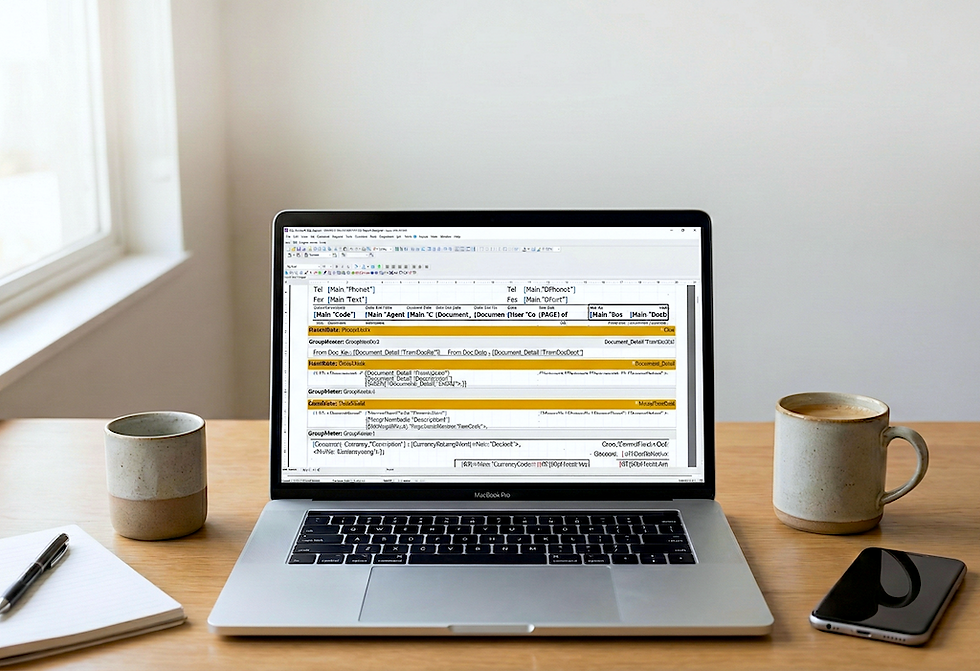AutoCount vs SQL Account: Which One Fits Singapore SMEs Best?
- Agnes Lee
- Oct 6, 2025
- 3 min read
Compare AutoCount and SQL Account side by side. See which suits Singapore SMEs better, and why SQL’s hybrid cloud (on-prem + private cloud) is a big win.
TL;DR — Quick Comparison
Category | AutoCount | SQL Account (Recommended) |
Deployment | On-prem and cloud offerings; strong retail/POS ecosystem | Hybrid by design: on-prem, secure remote access, or SQL Cloud (private cloud) with 100% DB ownership |
Feature depth | Robust SME features; popular for retail/POS | Advanced inventory, flexible reporting, project/department costing included |
Reporting & templates | Good built-ins; customization varies by edition | Report designer + formula fields; keyword search; flexible layouts |
Performance at scale | Good for typical volumes | Optimized SQL engine for high transaction volumes & large datasets |
Data ownership | Varies by setup | Perpetual licence + your database; SQL Cloud states 100% DB ownership |
GST InvoiceNow | GST InvoiceNow-ready | |
Best for | Retail & F&B with POS focus | Trading/wholesale, distribution, services and SMEs planning to grow |
Why this comparison matters
Both platforms cover SME basics. The big difference shows up when you want cloud flexibility without giving up desktop power or data ownership. That’s where SQL’s hybrid approach shines.
1) Cloud your way: SQL’s hybrid advantage
On-prem for maximum speed in the office.
Secure remote access (portal/RDP) when staff work from home or branches.
SQL Cloud (private cloud) to access anywhere with full desktop features and 100% database ownership (no forced multi-tenant limits).
Result: One database, one workflow, no SaaS lock-in or “lite” editions.
2) Performance when volumes grow
If your invoices, SKUs, or branches increase, you’ll feel the difference. SQL Account is built on a modern SQL stack and is positioned to handle high transaction volumes and large datasets smoothly (fast searches, stable posting, less archiving pain).
3) Inventory & sales that protect margins
Both systems handle standard stock scenarios. SQL goes deeper out of the box for trading/wholesale:
Multi-warehouse, serial/batch, expiry tracking, UOM conversion
BOM/light manufacturing when you grow into it
Credit-limit controls and document rules to keep receivables healthyThese are repeatedly highlighted in SQL’s official feature pages.
4) Reports you’ll actually use
SQL Account includes:
Drag-and-drop report designer with formula fields
Keyword search across transactions; customizable layouts by user roleThat means less Excel patchwork and faster answers.
5) Compliance without the scramble
Generate IRAS-friendly GST reports with drill-downs.
Connect to InvoiceNow (Peppol) e-invoicing via the supported connector.
Keep tamper-evident audit trails for clean reviews.
6) Cost & data ownership
(Total Cost of Ownership over 3–5 years)
With SQL you own the licence and, on SQL Cloud, own the database. That reduces long-term subscription drag and makes exit simple (no painful exports). SQL Account is also listed as pre-approved under Singapore’s PSG (up to 50% support, eligibility applies)—useful if you’re cost-sensitive.
So… which one fits your situation?
Retail / F&B with heavy POS
→AutoCount has a strong reputation in that space.
Trading / distribution / services; want hybrid cloud now or later → SQL Account is the safer bet for flexibility, performance, and ownership.
Fast, low-stress go-live with Apscom
We set up your database and hosting (on-prem or SQL Cloud).
We’ll import your customers, suppliers, and inventory lists so you start clean.
Hands-on training + WhatsApp support in SG time zone.
Final verdict
If you value speed, control, and future flexibility, SQL Account wins especially with SQL Cloud and remote-access options that keep your full features and data ownership intact.
👉 Want a side-by-side demo with your workflows?






Comments